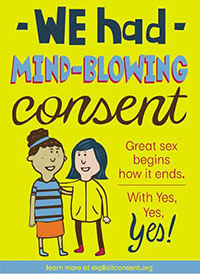Relationships
Healthy relationships
Everyone deserves having healthy relationships in their lives. This includes friendships, partnerships, and relationships with family members. Often times, students are not sure what a healthy relationship looks like, nor has one been modeled for them. The MSUB (2018) climate survey indicates that many students are experiencing emotional abuse. When we hear abuse, we typically think of black eyes and bruises. However, abuse is very much emotional and the damage can have lasting negative effects.
What is a healthy relationship?
Relationships come in many different forms: family members, friends, significant others, co-workers, and even acquaintances. It is important to know that not all relationships look the same. There are fundamental aspects such as respect, support, and autonomy that everyone deserves to feel in their relationship. Violence in any form is never acceptable.

- Valuing each other’s opinions
- Disagreements occur safely, without name calling and manipulation
- There is no use of guilt
- Partners accept responsibility for their own actions
- Mistakes are owned and learned from
- Boundaries are established and respected
Support
- Partners support each other’s values, beliefs, and goals
- Successes are celebrated
- Support one another through difficult times
Trust and honesty
- Partners feel safe being open and honest
- Partners are honest with their own needs
- Honesty is important and valued in the relationship
Communication
- Communication is ongoing. Manipulation, intimidation, and fear are not used as a form of communication.
- Listening is active. It requires you to hear your partner and respond appropriately.
- Decisions are made together
- Feelings and needs are free to be expressed
- Conflict is a natural part of a relationship
Autonomy
- Each partner is an individual. Neither partner defines the other.
- Each partner identifies their own goals as an individual
- Personal growth is encouraged and supported by partners
What is an unhealthy relationship?
Having conflict in any relationship can be healthy, as long as it is resolved respectfully and responsibly. A relationship is unhealthy if it involves disrespectful, controlling, and/or abusive behavior. Typically, a pattern of abusive behaviors develops over time, where the abuse slowly becomes worse. If you or someone you know are experiencing any of the behaviors listed below, you may be in an unhealthy relationship. If you are looking for support, please contact the Phoenix Center, we are here to help.
- Threats of physical violence towards you, loved ones, or pets
- Using intimidation to control
- Physical violence such as throwing objects, hitting, kicking, strangulation, punching, slapping, using an object to create fear and pain
- Isolation from family, friends, work, and school
- Emotional abuse such as name calling, guilt trips, humiliation, ghosting, belittling
- Stalking behaviors such as checking a partner’s phone and computer
- Forcing unwanted sexual contact or coercion for sexual contact
Examples:
- “If you leave me, I’m going to kill myself.”
- “You will never be anything without me.”
Rape Culture: Rape culture perpetuates the belief that victims have contributed to their own victimization and are responsible for what has happened to them. Unfortunately, rape culture is taboo. Many people find it difficult to discuss or admit that rape culture is stereotyped, holding many false beliefs about rape. The false beliefs about rape often justify sexual aggression and trivialize the seriousness of sexual violence. Rape culture has a negative impact on survivors, serving as a silencing function for those who wish to share their stories.
Victim Blaming is a devaluing act that occurs when the victim(s) of a crime is held responsible – in whole or in part – for the crime(s) that have been committed against them.
Examples of victim blaming:
“You aren’t expressing any emotion, so it must not have happened.”
“You walked through a dangerous neighborhood, what did you expect?”
“That skirt is too short, no wonder you got raped.”

